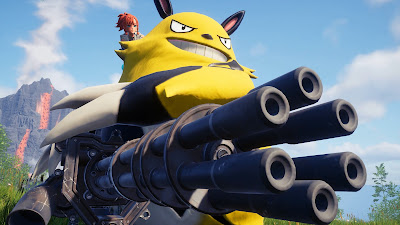Why Isn't Nintendo Suing Palworld? A Closer Look at Intellectual Property Rights and Game Development
Introduction:
In the ever-evolving landscape of gaming, the intersection of creativity and intellectual property rights often sparks intriguing debates. One such recent phenomenon is the emergence of Palworld, a game that appears to bear striking resemblances to Nintendo's iconic Pokémon franchise. Despite the similarities, Nintendo has notably refrained from taking legal action against Palworld's developers. In this article, we delve into the complexities surrounding this curious situation and explore the reasons behind Nintendo's decision.
Understanding Palworld:
Before delving into the legal intricacies, let's first understand what Palworld is all about. Developed by Pocketpair, Palworld is a game that combines elements of creature collecting, survival, and crafting. Players can capture and train creatures known as "Pals," build structures, and navigate various challenges in an open-world environment. The gameplay mechanics, art style, and even some creature designs bear striking resemblances to Nintendo's Pokémon franchise, raising eyebrows among gamers and industry observers alike.
The Legal Landscape:
At the heart of the matter lies the issue of intellectual property rights. Nintendo, as the creator and owner of the Pokémon franchise, holds exclusive rights to its characters, designs, and related assets. Any unauthorized use or reproduction of these elements could potentially infringe upon Nintendo's intellectual property rights, leading to legal consequences for the infringing party.
Palworld vs. Pokémon:
Upon examining Palworld and comparing it to Pokémon, it's evident that certain elements closely resemble those found in Nintendo's beloved franchise. From creature designs to gameplay mechanics, the similarities are hard to ignore. However, the legal implications of these resemblances are not always straightforward.
Factors Influencing Legal Action:
Despite the apparent similarities between Palworld and Pokémon, Nintendo has yet to take legal action against Palworld's developers. Several factors may be influencing this decision:
Degree of Similarity: While there are undeniable similarities between the two games, the degree to which Palworld directly copies Pokémon's intellectual property may not meet the threshold for legal action. Courts often consider factors such as transformative elements, substantial similarity, and market impact when assessing claims of copyright infringement.
Jurisdictional Challenges: Pocketpair, the developer of Palworld, is based in South Korea, adding a layer of complexity to any potential legal proceedings. Navigating international copyright laws and jurisdictional challenges can be daunting, making legal action less straightforward.
Strategic Considerations: Nintendo may be strategically evaluating the potential benefits and risks of pursuing legal action against Palworld. Engaging in lengthy and costly litigation may not always align with the company's broader objectives, especially if the perceived damages are minimal or if the case presents uncertainties regarding the outcome.
Community Response and Public Perception:
The gaming community has been abuzz with discussions surrounding Palworld and its similarities to Pokémon. While some view it as a blatant rip-off deserving of legal repercussions, others see it as a homage or parody that falls within the realm of fair use. Public perception plays a significant role in shaping the narrative surrounding intellectual property disputes, potentially influencing the decisions of both developers and rights holders.
Conclusion:
In the realm of intellectual property rights and game development, navigating the fine line between inspiration and infringement is no easy feat. While the similarities between Palworld and Pokémon may raise eyebrows, the decision of whether to pursue legal action ultimately rests with Nintendo. By understanding the complexities of the legal landscape and considering various factors at play, we can gain insights into why Nintendo has chosen not to sue Palworld's developers. As the gaming industry continues to evolve, these discussions serve as important reminders of the delicate balance between creativity and copyright protection.




.png)
.jpg)


0 Comments